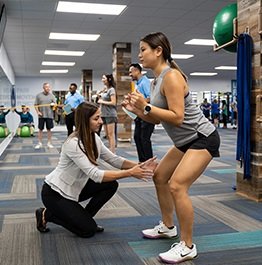
5 Tips For A Better Sleep At Night
April 28, 2022Sleep plays a vital role in your overall health and longevity, and yet countless people have a hard time getting enough of it! One of the primary reasons for lack of quality sleep is poor “sleep hygiene,” or the series of habits you do throughout the day that affect your ability to fall asleep and stay asleep. Before we go on to what we can do to help improve our sleep quality and quantity, let’s first discuss why sleep is so important, and how much sleep is enough.
Why Is Sleep Important?
Sleep is important because it helps to:
- Keep your brain functioning properly.
- Assist in formulating new pathways for learning and retaining information.
- Ensure that the decision-making, problem-solving, and emotion/behavioral control centers of your brain are in tip-top shape!
- Heal and repair processes of your heart and blood vessels.
- Balance your hormones that control hunger.
- Regulate how your body reacts to insulin, so a lack of sleep can put you at higher risk for obesity.
There is no wonder why a chronic lack of sleep is linked to several diseases, including heart disease, high blood pressure, diabetes, obesity, and stroke, just to name a few. The American Academy of Sleep Medicine (AASM) recommends adults 18 years or older get between 7-8 hours of sleep a night, and even more for children and adolescents below age 18. So now that we know why sleep is so important and how much we need it, let’s discuss a few tips for getting a great night’s rest.
Tips for Getting a Great Night Sleep:
-
Keep a consistent sleep schedule:
- Try to go to sleep and wake up at the same time every night, even on weekends or on vacation. This will allow your body to get accustomed to your preferred routine.
-
Make your bedroom quiet and relaxing.
- It is best to keep your room dark since the hormone Melatonin, the hormone which regulates circadian rhythm is secreted in response to darkness. Also, the best bedroom temperature for sleeping is between 60-67 degrees Fahrenheit. Try using a breathable mattress, sheet, comforter, and pillow to help maintain a comfortable body temperature at night.
-
Limit your exposure to bright light in the evenings:
- This includes looking at the blue light emitted by most electronics. Turn off all devices at least 30 minutes before bedtime!
-
Avoid eating a large meal right before bedtime!
- If you’re hungry, eat a light, healthy snack to prevent indigestion which could keep you tossing and turning all night.
-
Get out of bed & do a relaxing activity:
- If you can’t fall asleep within 20 minutes, get out of bed and do a quiet, relaxing activity without too much light exposure- this could be reading a book, meditating, or doing a few gentle stretches.
Try these practices every night for achieving quality sleep! Sometimes pain can be a huge hindrance in allowing for good, restful sleep. If you are having difficulty either falling asleep or staying asleep due to pain, come in for a free assessment and see how Physical Therapy at Coury & Buehler Physical Therapy can help you!
References: https://sleepeducation.org/healthy-sleep/healthy-sleep-habits/ https://www.nhlbi.nih.gov/health-topics/sleep-deprivation-and-deficiency#:~:text=Sleep%20plays%20an%20important%20role,pressure%2C%20diabetes%2C%20and%20stroke
If you are experiencing pain due to continuous bad night's sleep, contact us! Our Physical Therapists are here to help. Fill out this form and we will contact you to schedule an appointment.
WANT MORE TIPS?
Latest posts by Chyna Cotangco, PT, DPT (see all)
- Importance of Rest & Recovery - September 01, 2022
- Morning Vs. Evening Workouts: Which Is Better? - June 29, 2022
- 5 Tips For A Better Sleep At Night - April 28, 2022
Reader Interactions
Leave a comment Cancel reply
You must be logged in to post a comment.
SIGN UP FOR
LIFE+ is a FREE membership
that offers:
• Informative Newsletters
• Health & Wellness Tips
• Videos from Our Experts
• Special offers
…and much more!
SEARCH





